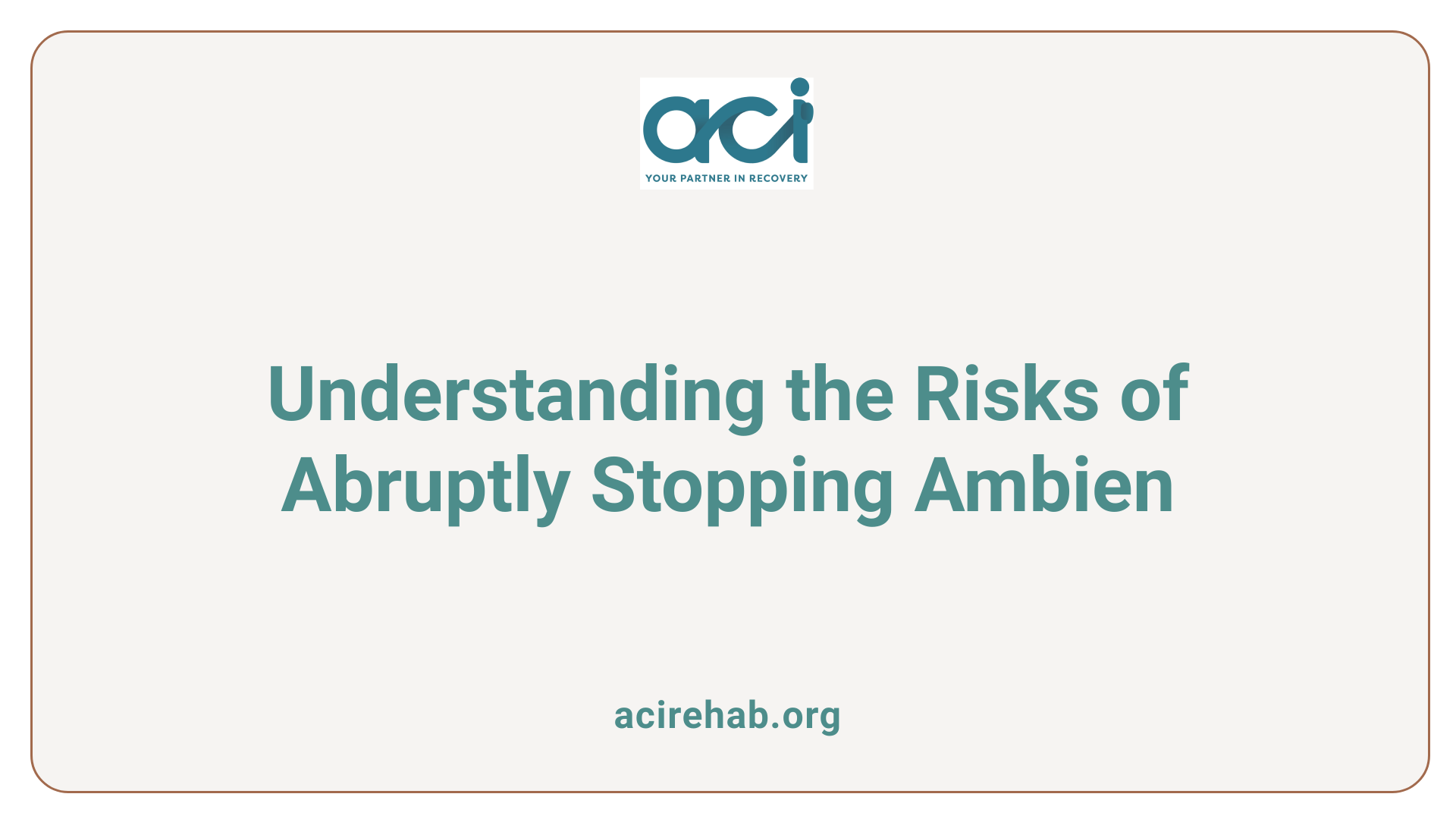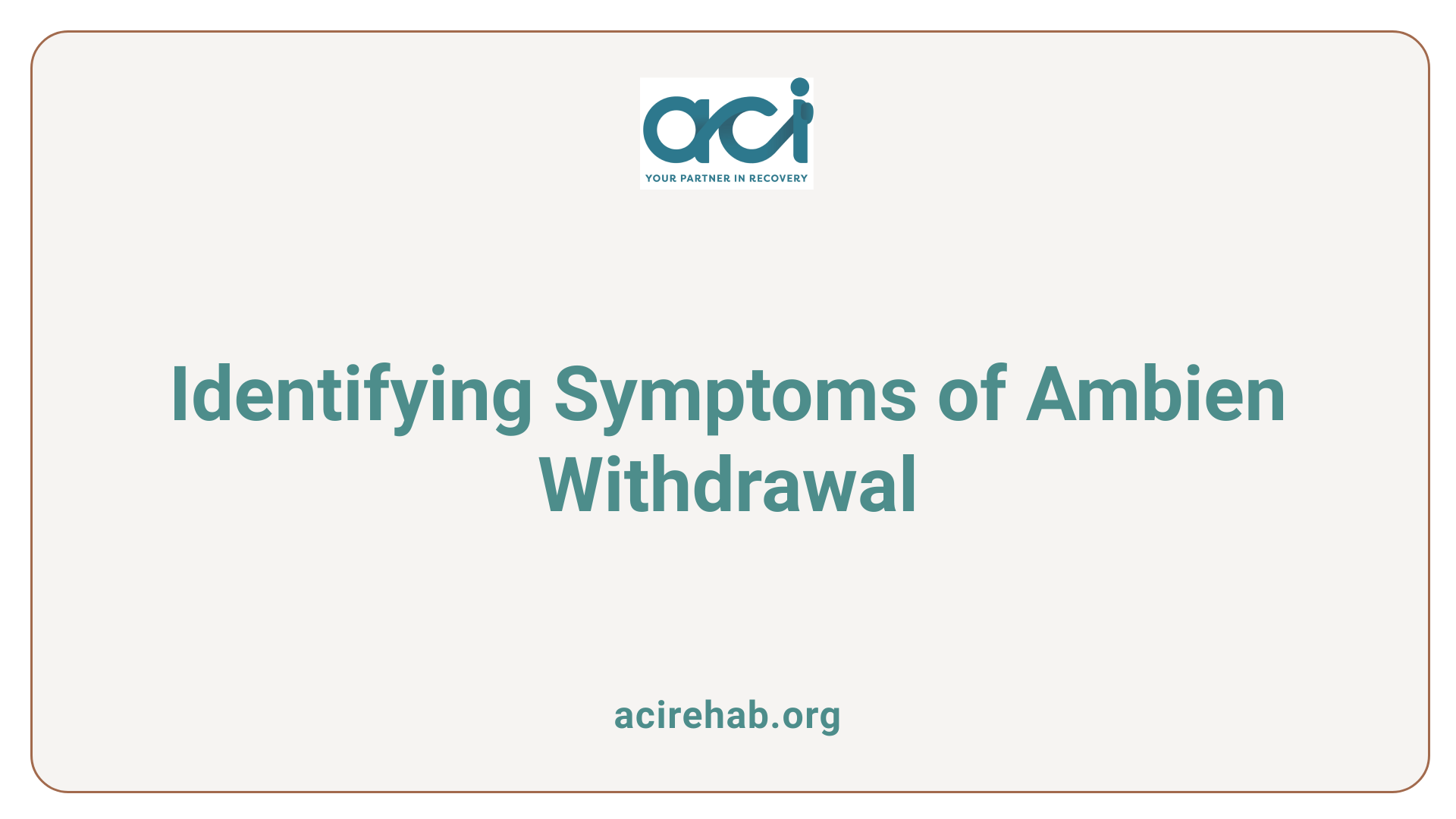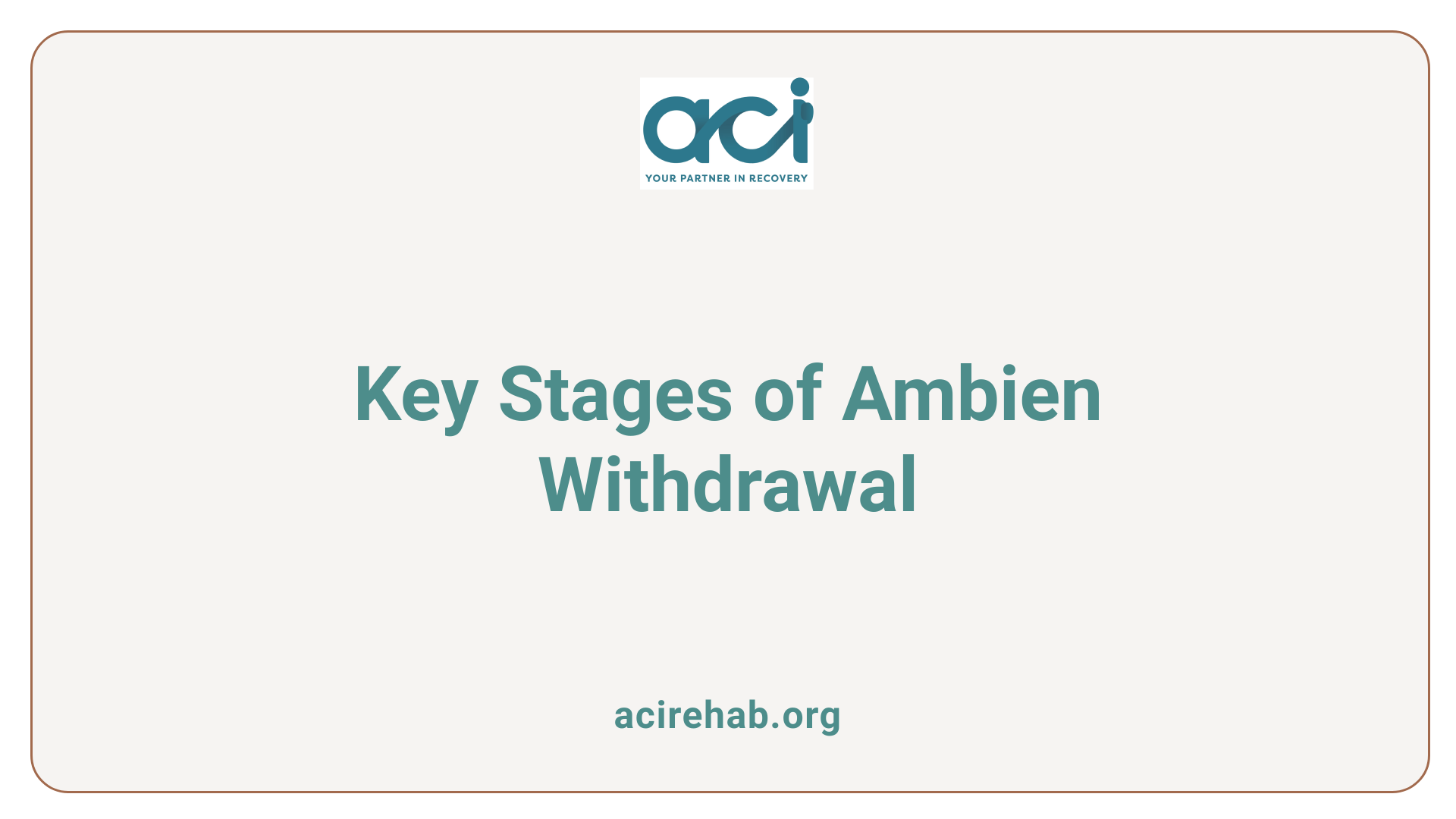Exploring the Safety and Risks of Stopping Ambien Cold Turkey
Ambien, known generically as zolpidem, is a popular prescription medication used for treating insomnia. While effective for short-term relief, long-term use of Ambien is not advised due to the risks of dependency and withdrawal symptoms associated with abrupt cessation. Understanding the implications and safety concerns of stopping Ambien suddenly, also known as going ‘cold turkey’, is crucial for those who regularly use the medication. This article delves into the potential dangers, withdrawal symptoms, and safer alternatives for discontinuing Ambien use.
Is it Safe to Stop Taking Ambien Suddenly?

Safety of Abrupt Ambien Cessation
Stopping Ambien suddenly is generally not considered safe, especially for individuals who have been using the medication for an extended period or at higher prescribed dosages. Research indicates that withdrawal symptoms can begin as soon as 4-8 hours after the last dose and can include anxiety, confusion, and in severe instances, seizures. A notable case involved a young man who experienced acute delirium after abruptly halting a high dosage of zolpidem, necessitating medical intervention.
Risk Factors for Severe Withdrawal
Several factors can contribute to the severity of withdrawal symptoms:
- Duration of Use: Long-term users are at a greater risk of experiencing intense withdrawal symptoms compared to those who use it for short intervals.
- Higher Dosage: Individuals on higher dosages face elevated risks, with possible symptoms like mood swings, insomnia, and seizures.
- Co-occurring Substance Use: Mixing Ambien with alcohol can heighten the depressant effects and lead to dangerous outcomes, including overdose.
Medical Supervision Importance
Gradually tapering off Ambien is crucial to ensure safety and minimize withdrawal symptoms, rather than stopping cold turkey. Medical supervision plays a vital role in this process, allowing for a structured approach to dosage reduction while monitoring for potential complications. Treatment options such as behavioral therapies or medical detox may be recommended for those dealing with dependence, enhancing the overall chances of a safe withdrawal journey.
Recognizing Withdrawal Symptoms of Ambien

What are the withdrawal symptoms associated with stopping Ambien?
Withdrawal from Ambien, a common prescription aid for insomnia, can trigger a range of distressing symptoms. Common responses include:
- Difficulty sleeping (rebound insomnia)
- Anxiety and mood swings
- Irritability and restlessness
- Cravings for the medication
- Physical symptoms such as sweating, tremors, fatigue, nausea, and vomiting.
In severe cases, users might experience seizures and other intense reactions, emphasizing the need for careful management during this period.
Onset and duration of symptoms
The onset of withdrawal symptoms typically begins within 24 to 48 hours after the last dose of Ambien. Most acute symptoms peak within the first 1 to 5 days, and while physical symptoms may subside in 1 to 2 weeks, psychological effects like anxiety and cravings might linger for months. This highlights the challenges users face when discontinuing the medication.
Severity due to dosage and duration of use
The severity of withdrawal symptoms can significantly vary based on both dosage and duration of use. Those who have taken higher doses or used Ambien for an extended period are at greater risk for more intense withdrawal experiences. It is generally recommended to taper off gradually under medical supervision, as this approach lessens the risk of acute symptoms and complications. Cold turkey cessation poses serious risks, including an increased chance of severe reactions, such as delirium or seizures.
Achieving a successful discontinuation often necessitates seeking professional help, particularly for individuals with a history of longer-term Ambien use or higher dosages.
The Timeline of Ambien Withdrawal

Initial withdrawal stages
Withdrawal from Ambien typically begins between 4 to 8 hours after the last dose. Users may first experience mild symptoms such as anxiety, irritability, and tremors. More significant symptoms, including rebound insomnia, can develop shortly thereafter. This initial phase is critical, as the body reacts to the sudden absence of zolpidem, leading to discomfort and emotional distress.
Peak symptom intensity
Symptoms generally peak within 1 to 5 days following the abrupt cessation of Ambien. This is when individuals may encounter the most severe withdrawal effects, such as heightened anxiety, panic attacks, and, in some cases, seizures. While rebound insomnia may intensify during this time, other physical and psychological withdrawal symptoms can include rapid heart rate, sweating, and cognitive impairments. The peak duration can vary, affected by the individual’s history of usage and dosage.
Resolution of symptoms over time
Most withdrawal symptoms begin to subside after about 1 to 2 weeks. Although physical symptoms often diminish, psychological symptoms such as mood swings and cravings might linger. Individual factors such as past usage patterns and additional mental health issues can influence recovery time, with some experiencing mild symptoms for longer periods. To ensure safety and comfort, consulting a healthcare professional during this period is recommended.
Safe Approaches to Discontinuing Ambien
How should someone taper off Ambien safely?
To taper off Ambien safely, it is recommended to gradually reduce the dosage over a period of 4 to 8 weeks. A common strategy involves decreasing the dose by 10-25% per week, which allows the body to adjust to lower levels of the medication. Medical supervision is crucial during this process to monitor withdrawal symptoms and modify the tapering schedule as necessary.
Withdrawal symptoms can begin within 6-8 hours after the last dose and may show up as insomnia, anxiety, agitation, or irritability. These symptoms generally peak within 1-5 days and can last from 1-2 weeks, making it important to manage them with proper care.
What role does medical supervision play in the tapering process?
Medical supervision not only helps in monitoring withdrawal symptoms but also ensures safety. Physicians can provide tailored support, adjust tapering speeds, and suggest alternative therapies to alleviate discomfort. For example, patients may benefit from alternative sleep aids such as melatonin or trazodone to manage insomnia during the tapering phase.
Why consider alternative sleep aids during withdrawal?
Using alternative sleep aids can ease the challenges of insomnia and anxiety during Ambien withdrawal. It’s crucial to consult a healthcare provider who can recommend safe options, ensuring that these alternatives do not interfere with the tapering process. This proactive approach helps to reduce the severity of withdrawal symptoms while ensuring patients have adequate support throughout their transition away from Ambien.
Long-term Implications of Stopping Ambien Cold Turkey
Consequences of Physical Dependence
Stopping Ambien suddenly can lead to significant withdrawal symptoms, particularly for those who have developed physical dependence. The body, having adjusted to the presence of the drug, may react strongly when it is removed. Common withdrawal symptoms include anxiety, insomnia, and tremors, which can severely disrupt daily functioning.
Potential for Rebound Insomnia
One of the most challenging side effects of ceasing Ambien abruptly is rebound insomnia. This phenomenon can cause sleep difficulties to worsen compared to the original insomnia symptoms that prompted treatment. Consequently, individuals may experience extended periods of sleeplessness, leading to fatigue and decreased quality of life.
Impact on Overall Health and Well-being
Long-term users who stop Ambien cold turkey may face heightened anxiety, mood swings, and fatigue, impacting their overall mental and physical health. In severe cases, withdrawal can escalate to dangerous symptoms such as seizures or convulsions, especially in individuals with a history of substance use disorder. Thus, seeking medical supervision during discontinuation is vital for safety and effective recovery.
| Implication | Description | Recommendation |
|---|---|---|
| Physical Dependence | Risk of intense withdrawal symptoms due to tolerance | Gradual tapering under supervision |
| Rebound Insomnia | Worsening of sleep issues after stopping | Avoid abrupt cessation |
| Overall Well-being | Potential for anxiety, mood swings, or severe reactions | Consult a medical professional |
Options for Managing Ambien Dependence
Medical Detox Programs
Medically supervised detox programs provide a safe environment for individuals looking to stop using Ambien. These programs offer round-the-clock care, allowing professionals to monitor withdrawal symptoms closely. Such supervision is crucial, especially for those with a history of dependency or severe withdrawal reactions. The medical team can offer medications to manage discomfort and help stabilize the patient safely.
Behavioral Therapies
Behavioral therapies are essential in addressing the underlying issues of insomnia and drug dependence. Cognitive Behavioral Therapy (CBT) can help modify sleep patterns and improve coping mechanisms. Counseling can also assist individuals in developing new, healthier habits to replace their reliance on Ambien for sleep.
Professional Support Systems
A network of support is critical during the recovery process. Professionals can guide patients in creating tailored tapering schedules while offering encouragement through regular check-ins. Group therapy and support groups can provide a shared experience, fostering motivation and reducing feelings of isolation.
| Option | Description | Benefits |
|---|---|---|
| Medical Detox Programs | Supervised care to manage withdrawal safely | Reduces risk of severe withdrawal |
| Behavioral Therapies | Therapy to modify habits and coping strategies | Addresses root causes of insomnia |
| Professional Support | Guidance and encouragement from specialists and peers | Promotes accountability |
How Long Does Ambien Stay in Your System?
How long does Ambien remain detectable in the body after cessation?
Ambien, known scientifically as zolpidem, typically remains detectable in the body for varying periods, depending on the type of drug test conducted. Here’s a quick breakdown of detection windows:
| Test Type | Detection Window | Notes |
|---|---|---|
| Urine Tests | 24-48 hours | Common for most screenings. |
| Blood Tests | 6-20 hours | Less frequently used, but important for acute situations. |
| Hair Tests | Up to 5 weeks | Not commonly used for recent use detection. |
The drug’s half-life is about 2.5 to 3 hours, meaning half of the Ambien is eliminated from the body in that timeframe. Individual factors such as age, weight, and liver or kidney function can influence these timelines.
What factors affect how quickly Ambien is eliminated?
Several factors play a role in how quickly Ambien is eliminated from the body. Factors include:
- Metabolism: Faster metabolic rates lead to quicker elimination.
- Age: Older adults may process the drug more slowly.
- Health: Liver or kidney function can significantly alter drug clearance rates.
When do withdrawal symptoms start in relation to Ambien detection?
Withdrawal symptoms may commence within 48 hours of discontinuation. They can vary significantly based on usage patterns, with increased severity linked to longer or higher dose usage. This timeline is important for managing potential withdrawal effects and connecting individuals with necessary medical support.
Rehabilitation or a medically supervised detox might be required for those who have developed a dependency on Ambien.
Conclusion: Weighing the Risks and Seeking Proper Care
Deciding to stop taking Ambien should be approached with caution, particularly for long-term or high-dose users who may face significant withdrawal challenges. Abrupt cessation is fraught with risks, including severe withdrawal symptoms and health complications. Medical supervision and gradual tapering are strongly recommended to ensure safety and effectiveness in discontinuing Ambien. Professional guidance not only aids in minimizing withdrawal symptoms but also provides support in overcoming potential dependencies. Those considering quitting Ambien should consult healthcare providers to develop a personalized and safe plan for discontinuation. By understanding the complexities involved in stopping Ambien use, individuals can take informed steps to regain their well-being and improve sleep health without dependency on medication.
References
- Ambien Withdrawal Symptoms, Timeline & Detox Treatment
- Can You Stop Taking Ambien Cold Turkey? – Conifer Park
- Ambien Withdrawal Symptoms, Detox, And Timeline – Addiction Center
- How to Wean Off Ambien and Still Sleep – American Addiction Centers
- How to Wean Off Ambien: Ambien Taper Schedule
- Ambien Withdrawal | Vogue Recovery Center | Phoenix & Las Vegas
- How To Wean Off Ambien: Ambien Taper Schedule
- Quitting Ambien Cold Turkey – Hired Power
- Ambien Withdrawal: Symptoms, Timeline, and Treatment
- Can You Stop Taking Ambien Cold Turkey? – Steps to Recovery

